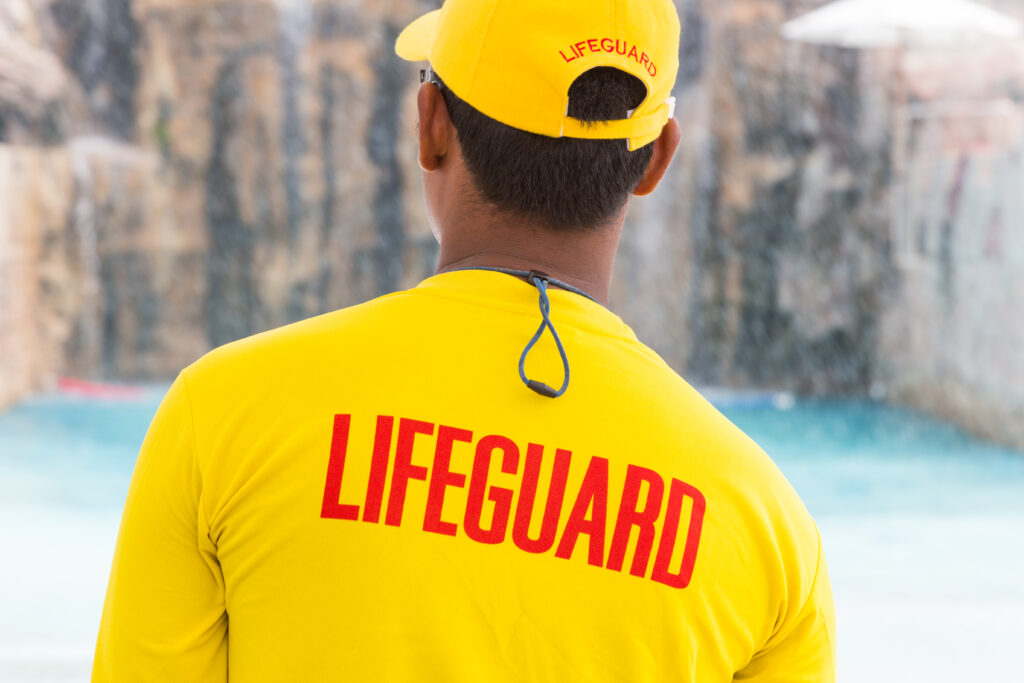Summer is soon approaching which means pools and beaches will be opening. While your kids are having fun splashing in the surf, it is important to keep in mind water safety.
When I was 16 years old, I got my first real job as a lifeguard for the public town pool. Now that I’m a parent, I understand how necessary it is for me to watch my children and not rely on the lifeguard.
According to the National Center for Health Statistics (NCHS), an average of 3,868 deaths per year occur due to unintentional drowning in the United States. Children ages 1–4 years old were most likely to drown in a swimming pool. People in the age range of 5-19 years old were most likely to drown in natural water such as an ocean or lake.
Based on my experience as a lifeguard, here are a few reasons I watch my children when they swim:
-
It Was My First Job
Translation – I had no experience. Sure, I got the proper certifications, but I never had a job before, and I never was responsible for ensuring the safety of other people’s lives. I don’t think I really understood how serious it was to be entrusted with this job. I thought being a lifeguard sounded like fun. I was getting paid to sit in the sun and socialize with my friends – that’s how teenagers viewed it.
-
It Was Low Paying
Granted, this was a while ago and the pay can vary depending on where you work, but at my first lifeguard job I was paid $4.25 per hour (it wasn’t a lot back then either – today’s dollar equivalent is $8.86). According to PayScale, the average rate for a lifeguard now is $12.23, which might not be considered a lot of money to a teenager. Even though I was a responsible person, there are teens who view this low pay as a reason to not pay attention.
-
It’s Hard to See/Hear Everything
On hot, crowded days, there are hundreds of people in the pool. Kids are screaming to get their friend’s attention, parents are yelling at their kids to get out of the pool and the other lifeguard is hollering yet again to the child running, “you need to walk, not run.” It’s hard to hear over all this commotion. If your child yells “help,” then I might not be able to hear it. Or if they are struggling to swim, I might not be able to see it. With so many people in the pool all moving in different directions, it’s hard to keep track of everyone.
-
I’m Not a Disciplinarian
The rules for no running or no diving in shallow water exist because they’re unsafe. I had a hard time enforcing these rules since I didn’t know how to discipline other people’s children (they don’t teach that during the lifeguard certification class). This creates an unsafe situation not only for your own children but other people as well if parents don’t help to enforce these rules.
-
People Crack Under Pressure
One time while I was a lifeguard, a person had a seizure and was drowning. I was not near the person when it happened, but the lifeguard that should have rescued this person froze in fear and did nothing. Luckily another nearby lifeguard stepped in and rescued the person.
As a Parent You Should:
- Always watch your child in the pool or other bodies of water, even if they know how to swim. Knowing how to swim doesn’t mean you can’t drown.
- Help enforce the pool rules like no running and no diving in shallow areas. Kids can easily slip on the wet cement when they run. And if you dive in shallow areas, you can hit your head, which could cause paralysis.
- Make sure your child understands the pool gradually gets deeper. I once saw a child almost drown because they didn’t understand this concept and walked to a point where they could no longer stand.
- Understand that arm floaties can come off your child. Don’t rely on these to keep your child’s head above water.
- Understand that kids can drown in a puddle of water, and it only takes seconds.
The CDC found most drownings are preventable. Drownings usually occur in areas without lifeguards. But even when there is a lifeguard, as a parent it is important to have your guard up as well.

